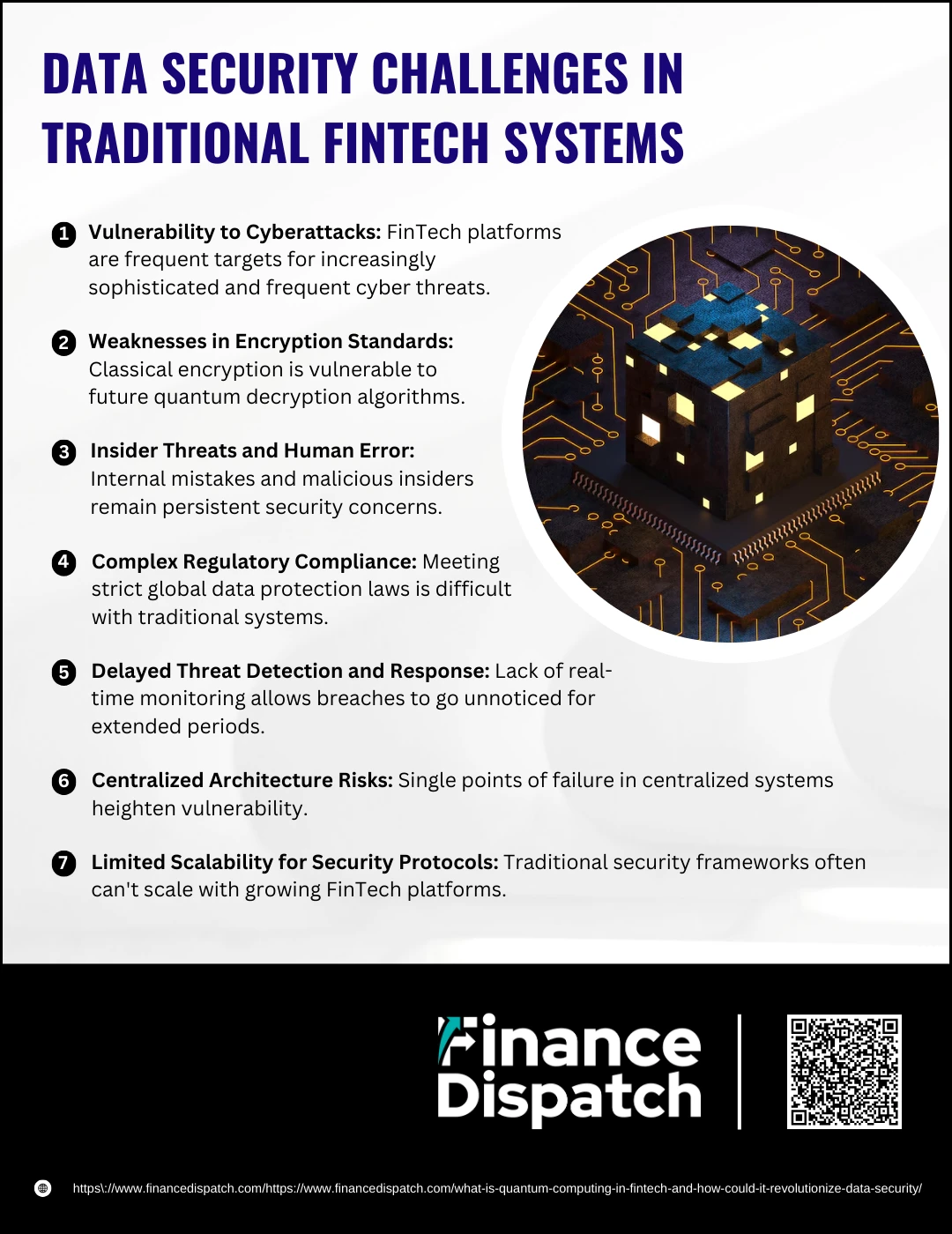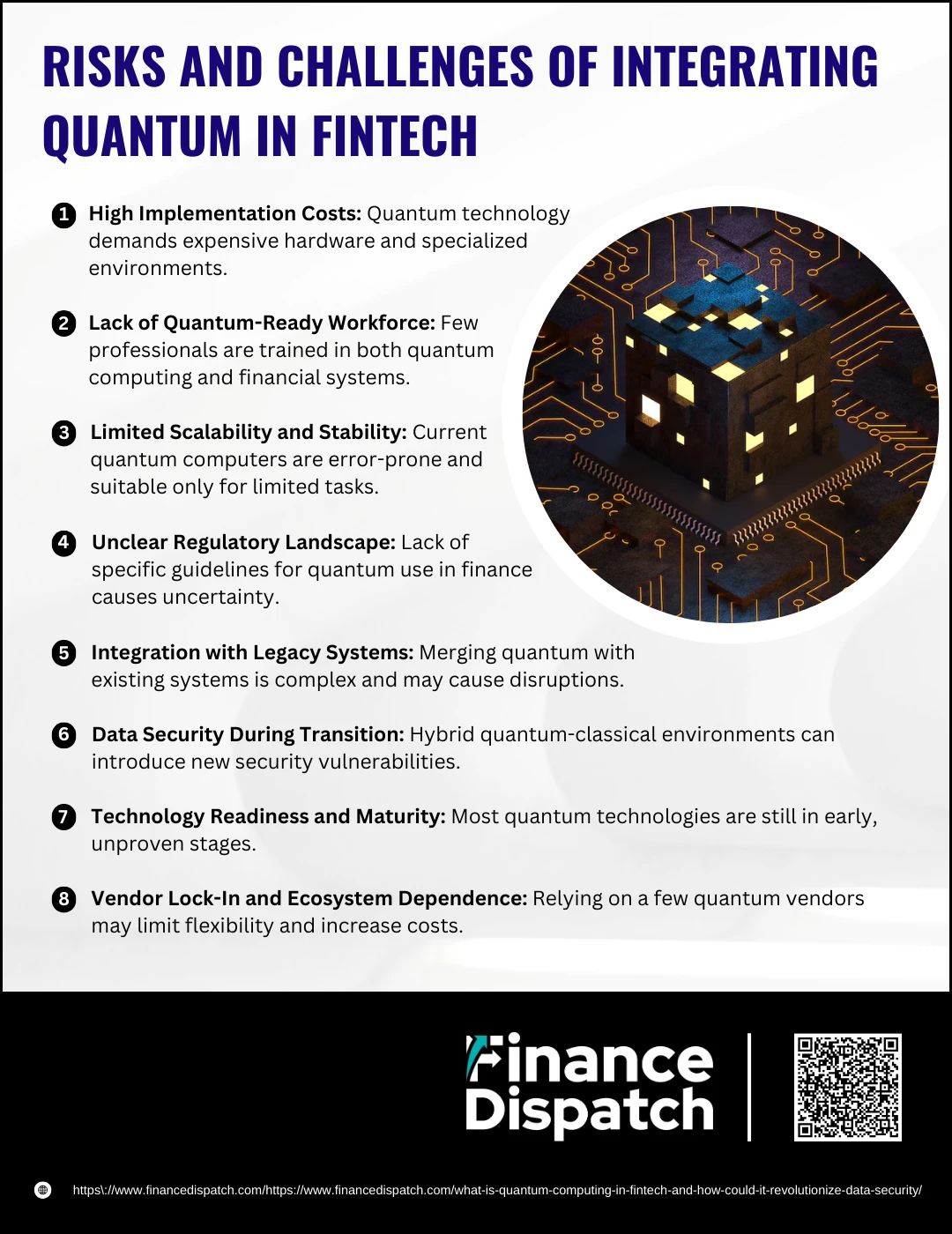In today’s digitally driven financial world, security and speed are paramount. As financial transactions grow more complex and cyber threats more sophisticated, traditional computing methods are nearing their limits. Enter quantum computing—a revolutionary approach that leverages the strange laws of quantum mechanics to solve problems that classical computers can’t handle efficiently. In the realm of FinTech, quantum computing holds immense promise, not just for accelerating computations but for transforming how sensitive financial data is protected. This article explores what quantum computing is, how it fits into the FinTech landscape, and why it could be the future of data security.
What is Quantum Computing in FinTech?
Quantum computing in FinTech refers to the application of quantum mechanics-based computing systems to solve complex financial problems faster and more efficiently than traditional computers. Unlike classical computers that use bits (0s and 1s), quantum computers use qubits, which can exist in multiple states simultaneously, enabling massive parallel processing. This capability allows financial institutions to perform tasks like risk assessment, portfolio optimization, and fraud detection with unprecedented speed and accuracy. By harnessing quantum algorithms, FinTech companies aim to gain deeper insights, enhance predictive analytics, and make smarter, data-driven decisions in real time.
Why FinTech Needs Quantum Computing
The FinTech industry operates in an environment where rapid data processing, real-time decision-making, and robust security are essential. As financial systems grow increasingly complex, traditional computing struggles to keep up with the volume and intricacy of data involved in tasks like risk modeling, fraud detection, and asset optimization. Quantum computing offers the potential to process vast datasets at extraordinary speeds, uncover hidden patterns, and solve problems considered intractable for classical systems. This enhanced computational power can lead to more accurate predictions, faster transactions, and stronger encryption—making it a vital tool for future-ready FinTech solutions.
 How Quantum Computing Enhances Data Security
How Quantum Computing Enhances Data Security
As financial institutions face growing cybersecurity threats and increasingly complex digital infrastructures, the demand for more powerful, secure systems is at an all-time high. Quantum computing presents a revolutionary approach to data protection by harnessing the unique properties of quantum mechanics—superposition, entanglement, and quantum uncertainty. Unlike classical systems that are vulnerable to brute-force attacks and encryption cracking, quantum technologies can both protect data more effectively and detect breaches before they cause harm. This paradigm shift is poised to redefine how security is implemented across the FinTech landscape.
Here are key ways quantum computing enhances data security:
1. Quantum Key Distribution (QKD)
QKD uses quantum particles like photons to share encryption keys between two parties. Any attempt to eavesdrop on these keys alters their state, immediately alerting both parties to a security breach. This ensures that only authorized users can access sensitive data.
2. Quantum-Resistant Encryption
Traditional encryption methods like RSA and ECC could be broken by powerful quantum computers using algorithms such as Shor’s. Quantum computing drives the development of new encryption standards—called post-quantum cryptography—that are resistant to both classical and quantum attacks.
3. Unbreakable One-Time Pad Encryption
Quantum systems can generate truly random numbers, which are essential for creating one-time pads—encryption methods that are theoretically unbreakable when used correctly. These quantum-generated keys enhance confidentiality for highly sensitive data.
4. Faster Threat Detection
Quantum computing can process and analyze vast amounts of network traffic data faster than classical systems. This allows for the rapid identification of anomalies or malicious activity, enabling real-time threat response and proactive defense mechanisms.
5. Secure Multi-Party Computation (SMPC)
With quantum protocols, multiple entities can collaboratively compute results without revealing their individual data inputs. This is particularly valuable in FinTech, where partnerships often involve highly confidential information that must remain private while still enabling joint analysis or transactions.
Applications of Quantum Computing in FinTech
Quantum computing is set to transform the FinTech sector by solving problems that are currently too complex or time-consuming for classical computers. Its ability to process and analyze enormous datasets simultaneously opens the door to smarter financial modeling, faster decision-making, and more secure transactions. From optimizing investments to enhancing fraud detection, quantum technology is poised to bring speed, accuracy, and innovation to a wide range of financial applications.
Here are some key applications of quantum computing in FinTech:
- Portfolio Optimization
Quantum algorithms can quickly analyze countless investment combinations to identify the most efficient portfolio with the best risk-return balance. - Risk Analysis and Management
Quantum models can simulate a vast number of financial scenarios to provide more accurate risk assessments and stress testing. - Fraud Detection
Quantum systems can identify subtle anomalies in massive transaction datasets, improving the speed and precision of fraud detection. - Algorithmic and High-Frequency Trading:
By analyzing market trends and patterns in real time, quantum computing enables traders to execute strategies with greater speed and success rates. - Credit Scoring and Loan Approval
Quantum algorithms can process and evaluate multiple risk factors to generate more precise credit scores and lending decisions. - Cybersecurity Enhancement
Quantum-powered encryption and real-time threat detection protect financial systems from increasingly complex cyberattacks. - Blockchain and Smart Contract Verification
Quantum computing can accelerate the verification and validation of blockchain transactions, improving efficiency and trust in decentralized systems.
 Data Security Challenges in Traditional FinTech Systems
Data Security Challenges in Traditional FinTech Systems
The FinTech industry thrives on trust, speed, and data accuracy, yet traditional security frameworks are increasingly ill-equipped to handle modern-day threats. With the rise of digital banking, mobile payments, blockchain platforms, and AI-driven financial services, the volume and complexity of data have skyrocketed. Traditional systems, which rely heavily on classical encryption and centralized networks, are often reactive rather than proactive—making them vulnerable in a landscape dominated by cybercriminals and emerging technologies. Moreover, the looming threat of quantum computing cracking classical encryption adds urgency to the search for more secure alternatives.
Here are some of the key data security challenges faced by traditional FinTech systems:
1. Vulnerability to Cyberattacks
FinTech platforms are attractive targets for cybercriminals due to the high value of financial data. Attacks like phishing, ransomware, and zero-day exploits are becoming more sophisticated and frequent, often outpacing the ability of current security systems to respond.
2. Weaknesses in Encryption Standards
Widely used encryption methods such as RSA and elliptic curve cryptography rely on mathematical problems that are hard for classical computers to solve but could be easily broken by quantum algorithms like Shor’s. This poses a future risk to all encrypted financial communications and stored data.
3. Insider Threats and Human Error
Not all breaches come from external threats—insiders with access to sensitive systems may unintentionally expose data or act maliciously. Human error, such as misconfigured firewalls or mishandling credentials, continues to be a major security gap.
4. Complex Regulatory Compliance
Compliance with global data protection laws (e.g., GDPR, PCI DSS, CCPA) demands high levels of transparency, auditing, and customer data control. Traditional systems often struggle to provide these features efficiently and consistently, leading to potential legal and financial consequences.
5. Delayed Threat Detection and Response
Many traditional security solutions detect threats after they’ve occurred. Without real-time analytics and predictive tools, breaches can go unnoticed for days or even weeks, increasing the damage inflicted on systems and customers.
6. Centralized Architecture Risks
Centralized databases and services act as single points of failure. If compromised, they can lead to wide-scale breaches affecting millions of users. Additionally, these structures can become bottlenecks, reducing both security and performance.
7. Limited Scalability for Security Protocols
As financial platforms expand, their existing security infrastructure may not scale effectively. Outdated systems and patchwork solutions often create vulnerabilities during integration, leaving gaps that can be exploited.
 Risks and Challenges of Integrating Quantum in FinTech
Risks and Challenges of Integrating Quantum in FinTech
Quantum computing holds immense promise for the FinTech industry, offering the ability to solve complex problems far beyond the reach of classical systems. However, bringing this transformative technology into practical financial applications is not a simple process. It involves navigating a landscape filled with technological, operational, and regulatory challenges. Since quantum computing is still in its early stages, most FinTech firms are cautious, balancing the potential rewards against the significant risks. Adopting quantum technology demands major shifts in infrastructure, skilled talent, financial investment, and compliance strategies—all of which must be carefully managed to avoid costly pitfalls.
Here are the major risks and challenges of integrating quantum computing in FinTech:
1. High Implementation Costs
Developing or accessing quantum computing capabilities comes with substantial financial barriers. Quantum processors require specialized environments like ultra-low temperatures and electromagnetic shielding. For FinTech firms—especially startups—this can be prohibitively expensive, limiting adoption to only the most resource-rich institutions or partnerships with major quantum providers.
2. Lack of Quantum-Ready Workforce
There is a global shortage of professionals with combined expertise in quantum computing and financial systems. This skills gap creates a bottleneck in innovation, as organizations struggle to find or train staff who can design, test, and deploy quantum algorithms tailored to FinTech use cases.
3. Limited Scalability and Stability
Current quantum computers, known as Noisy Intermediate-Scale Quantum (NISQ) devices, are prone to errors and can only handle small-scale computations. Their fragile nature means they are not yet suitable for large-scale financial operations, which limits the immediate practicality of many promising use cases.
4. Unclear Regulatory Landscape
Quantum computing introduces entirely new paradigms for data processing and security, which are not yet fully addressed by existing financial regulations. This uncertainty can deter investment and delay implementation, as companies wait for clearer guidance from regulatory bodies.
5. Integration with Legacy Systems
Most FinTech companies operate on well-established classical computing infrastructure. Integrating quantum solutions often requires significant redesigns and compatibility efforts, raising the risk of disruptions, errors, and downtime during the transition period.
6. Data Security During Transition
The hybrid environment created when quantum and classical systems coexist can lead to new vulnerabilities. Without robust encryption and secure protocols, sensitive financial data may be exposed during data transfer or algorithm execution between the two systems.
7. Technology Readiness and Maturity
Much of the quantum software and hardware landscape is still experimental. Algorithms that work in theory may not perform well on current devices, making real-world deployment a gamble. Many FinTech firms remain skeptical until more practical and scalable quantum systems are available.
8. Vendor Lock-In and Ecosystem Dependence
With only a few dominant players in the quantum space (e.g., IBM, Google, Rigetti, D-Wave), early adopters risk becoming dependent on proprietary tools and platforms. This lock-in can reduce long-term flexibility and increase costs, especially as the technology and its standards evolve.
The Future Outlook
The future of quantum computing in FinTech is both promising and transformative. As quantum hardware continues to evolve and become more stable, its real-world applications are expected to move from research labs into mainstream financial operations. In the coming years, we can anticipate significant breakthroughs in quantum cryptography, predictive analytics, and optimization algorithms tailored specifically for financial use cases. Collaborations between quantum technology companies and FinTech innovators are already laying the groundwork for scalable solutions that could redefine data security, trading efficiency, and risk management. Although challenges remain, the pace of progress suggests that quantum computing will soon become a vital tool in building a more secure, intelligent, and competitive financial ecosystem.
Conclusion
Quantum computing represents a groundbreaking shift for the FinTech industry, offering solutions to some of its most pressing challenges—especially in the realm of data security. By leveraging the principles of quantum mechanics, financial institutions can achieve faster processing, more accurate predictions, and far stronger encryption than ever before. While the road to full integration is lined with technical and regulatory hurdles, the potential benefits far outweigh the risks. As the technology matures, quantum computing is poised to become a cornerstone of the next-generation financial infrastructure—redefining how we secure, analyze, and manage financial data in the digital age.



